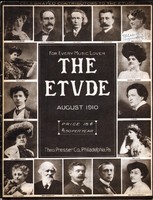By FREDERICK KITCHENER.
Some folks assure us that a piano should never be used when composing; such persons, however, are apt (if themselves composers) to pen strains which are found upon acquaintance to be noways free from fustiness.
Whether a piano is used or is not used in composition matters not a jot; the quality of the work itself is the only thing to be taken into consideration. The examples of Beethoven, Wagner, Schumann, Chopin and Tschaikowsky are surely enough to prove that the greatest composers often do use a piano to assist them in their work. One often thinks that to have heard Chopin extemporizing, when in his happiest mood, as the notes blood-warm welled up from his heart, must have been an experience never to be forgotten. Liszt, too—an improvisatore of tremendous power—often held his listeners enchained as he gave free play to his fancy. I heard, from an accomplished amateur, an account of an extemporization given by Liszt when staying in Rome, and in which the sounds and sights of the Eternal City were wonderfully suggested to the audience of the tone magician. The great performers of the present day—less gifted as composers than their predecessors—do not seem to attach much value to improvization; one reason for this may be that the attainment of the technical standard demanded at the present day takes up such an amount of time that none is left for matters not strictly necessary. Still, it is a great pity that such a delightful art should suffer neglect.
Some highly educated musicians extemporize in faultlessly correct form and their progressions never offend the ear; but fantasy and interest are often lacking. Much better to make a few technical errors and to do certain things not strictly "correct" than to have the result resemble a Dutch garden—stiff, formal and unmoving. But the whole department cannot be made a matter for the yard measure. No real musician is prepared to spin music, like a spider its web, at all times; and the extemporaneous performances of any musician, however gifted, must vary in quality. Mood plays a great part in the musical organization!
Returning once more to the immediate subject of this article, we may say that "sloppers" are of various kinds. The most common is the man who knows very little, if any, harmony, and who has not a really good ear. His performance is bald even to grotesquerie; if he does happen to get away from the common chord for a minute he is terribly frightened and scampers back to it again as quickly as possible. Then we have the man who has heard a lot of music and poses as a great authority, but who is soon bowled over where any question of "mere theory" or of technique is concerned. Such a man frivols fearfully, especially about Wagner; and he seems to imagine that his windy appreciation puts him upon a sort of equal level with the great composer. He seeks to make up for his lack of technique by a bombastic grandiosity, an over- expressiveness which disgusts any musical hearer very soon.—Musical Opinion.



